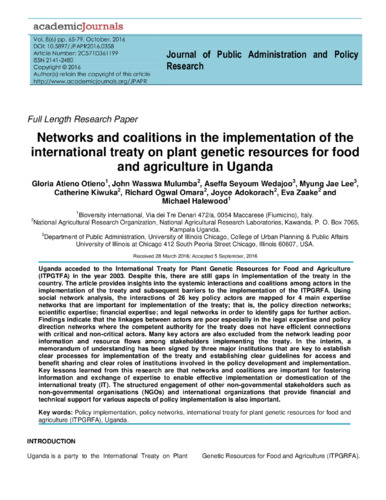Networks and coalitions in the implementation of the International Treaty on Plant Genetic Resources for Food and Agriculture in Uganda
Uganda acceded to the International Treaty for Plant Genetic Resources for Food and Agriculture (ITPGTFA) in the year 2003. Despite this, there are still gaps in implementation of the treaty in the country. The article provides insights into the systemic interactions and coalitions among actors in the implementation of the treaty and subsequent barriers to the implementation of the ITPGRFA. Using social network analysis, the interactions of 26 key policy actors are mapped for 4 main expertise networks that are important for implementation of the treaty; that is, the policy direction networks; scientific expertise; financial expertise; and legal networks in order to identify gaps for further action. Findings indicate that the linkages between actors are poor especially in the legal expertise and policy direction networks where the competent authority for the treaty does not have efficient connections with critical and non-critical actors. Many key actors are also excluded from the network leading poor information and resource flows among stakeholders implementing the treaty. In the interim, a memorandum of understanding has been signed by three major institutions that are key to establish clear processes for implementation of the treaty and establishing clear guidelines for access and benefit sharing and clear roles of institutions involved in the policy development and implementation. Key lessons learned from this research are that networks and coalitions are important for fostering information and exchange of expertise to enable effective implementation or domestication of the international treaty (IT). The structured engagement of other non-governmental stakeholders such as non-governmental organisations (NGOs) and international organizations that provide financial and technical support for various aspects of policy implementation is also important.

